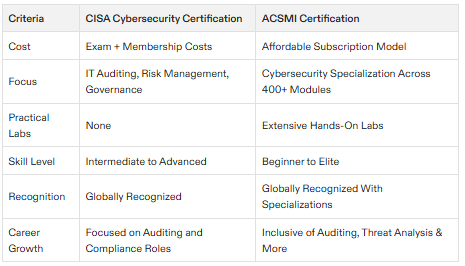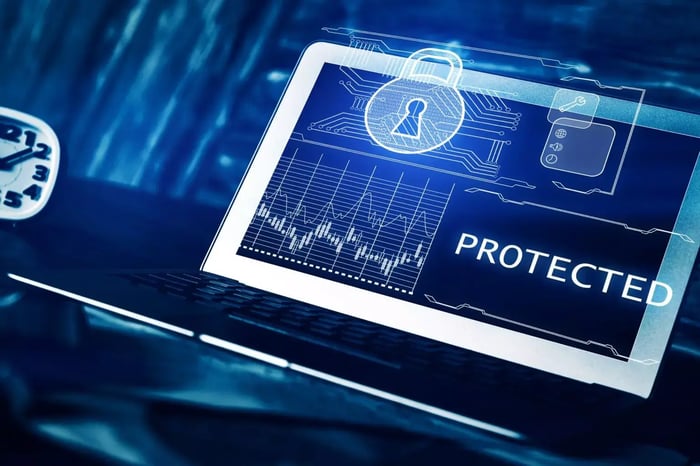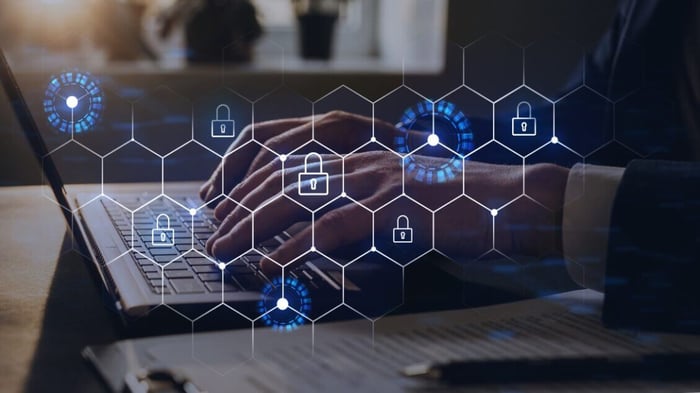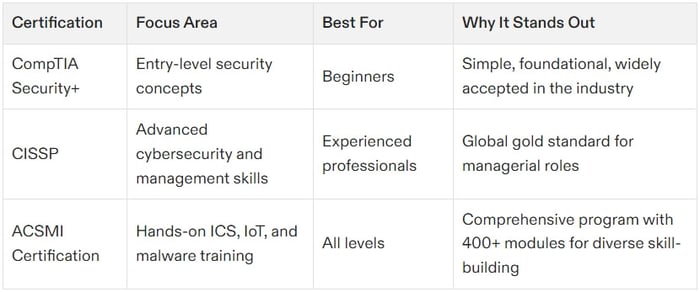Table of Contents
Cybersecurity has become the backbone of every business in the digital age, making certified professionals indispensable across industries. The CISA Cybersecurity Certification (Certified Information Systems Auditor) stands out as a globally recognized benchmark for IT auditing, governance, and risk management. With its focus on equipping professionals to secure and optimize information systems, CISA has become a must-have credential for those aspiring to thrive in high-demand roles.
Whether you’re an experienced IT auditor or looking to level up your cybersecurity knowledge, CISA certification offers the credibility and comprehensive skill set to achieve your career goals. But why stop there? Pairing CISA with advanced programs like ACSMI certification—featuring over 400 specialized modules—allows you to master cutting-edge cybersecurity tools and techniques alongside your auditing expertise.
What Is CISA Cybersecurity Certification?
The CISA Cybersecurity Certification (Certified Information Systems Auditor) is a globally recognized credential offered by ISACA. It is tailor-made for professionals focused on governance, auditing, and ensuring information security within an organization's IT environment. CISA is one of the gold standards in the cybersecurity world. It’s highly regarded by employers for its emphasis on identifying and managing vulnerabilities, overseeing audit controls, and ensuring information systems adhere to global security standards.
Whether you are aiming to advance your career or secure your first high-paying cybersecurity role, obtaining a CISA cybersecurity certification can make a significant difference. With the rapid increase in cyber threats and data breaches, organizations rely heavily on certified professionals to protect and optimize their IT infrastructure.
If you’re looking to build a complete skill set beyond CISA, pairing it with specialized programs such as ACSMI certification and its 400+ advanced modules can significantly enhance both your expertise and employability.
Why Pursue CISA Cybersecurity Certification?
1. Industry Recognition
CISA isn't just a certification—it’s a benchmark. Holding this credential opens doors to a wide range of high-demand roles in industries such as banking, healthcare, government, and tech. Employers highly value the insights and skills a CISA-certified professional brings to security risk assessments and IT audits.
2. Advanced Skill Development
CISA provides in-depth knowledge in five critical areas:
- Auditing Information Systems
- IT Governance and Management
- Acquisition, Development, and Implementation of Information Systems
- Information Systems Operations and Resilience
- Protection of Information Assets
This holistic approach ensures you’re not just focused on security but also have a deep understanding of governance and management principles.
3. Global Career Opportunities
With its international recognition, CISA certification equips professionals for career opportunities worldwide. Employers across the globe seek experts capable of aligning cybersecurity initiatives with organizational goals.
4. Pathway to Niche Roles
CISA lays the foundation for roles in IT auditing, compliance management, and vulnerability analysis. When combined with advanced certifications like ACSMI, you'll also gain access to specialized areas such as AI-powered threat detection, multi-cloud security, and ethical hacking.
5. Lucrative Salaries
The average salary of a CISA-certified professional is significantly higher than non-certified counterparts. Additionally, its recognition across industries makes it a smart investment in long-term career growth.
CISA Cybersecurity Certification Requirements
CISA isn't an entry-level certification. It is designed for professionals with experience in IT auditing and security. Below are some requirements to consider:
Five Years of Work Experience
Candidates must have at least five years of professional experience in IS auditing, control, or security. Some substitutions, such as a degree or other security certifications, may reduce this requirement.Passing the Exam
The CISA certification exam consists of 150 multiple-choice questions, with a passing score of 450 out of 800. It evaluates your proficiency in governance, risk management, and auditing processes.Adherence to ISACA Ethics Code
Maintaining the certification requires continued adherence to professional ethics and ISACA’s standards.Continuous Education
To keep the certification active, candidates must complete Continued Professional Education (CPE) credits every year.
Combining CISA with ACSMI Certification
While the CISA cybersecurity certification focuses on auditing and governance, combining it with ACSMI certification provides unparalleled depth in specialized domains.
ACSMI offers 400+ advanced modules with hands-on labs and industry-specific insights, covering areas CISA doesn’t emphasize such as:
- Red Team vs. Blue Team Training
- AI and Machine Learning in Cybersecurity
- Blockchain Technology and Applications
- Incident Response and Threat Hunting
By pursuing both credentials, professionals not only enhance their technical expertise but also become highly sought-after in multi-disciplinary roles that combine auditing, compliance, and advanced cybersecurity techniques.
Certification Comparison Table
FAQs About CISA Cybersecurity Certification
1. What jobs can I get with CISA certification?
With CISA certification, you can pursue roles like IT Auditor, Compliance Manager, Security Analyst, and Cyber Risk Consultant. By adding advanced credentials such as ACSMI certification, even high-profile roles like Chief Information Security Officer (CISO) become attainable.
2. How long does it take to prepare for the CISA exam?
Preparation time varies depending on prior experience but typically ranges between 10-12 weeks of focused study. Combining digital resources, mock tests, and training courses is recommended for success.
3. Is CISA difficult to achieve?
With a pass rate of around 50%, the CISA exam demands rigorous preparation. Having prior IT auditing or information security experience significantly improves your chances.
4. Are there online options for CISA exam prep?
Yes, many platforms offer online CISA prep courses, including ISACA itself. Additionally, you can benefit from advanced cybersecurity labs offered by ACSMI to enhance your overall skill set.
5. How does CISA compare to other certifications?
CISA is highly focused on IT auditing and governance, while certifications like Certified Information Systems Security Professional (CISSP) and ACSMI are broader in scope. The ideal choice depends on your career goals and interests.
Final Thoughts
The CISA cybersecurity certification is an exceptional credential for professionals looking to validate their expertise in auditing, governance, and controls. Its broad recognition across industries makes it a valuable asset for IT auditors, cybersecurity professionals, and managers seeking career advancement.
To maximize the value of your certification, consider combining it with advanced learning opportunities like ACSMI certification. With its wide-ranging modules and practical labs, ACSMI complements CISA by equipping you for specialized roles and emerging challenges in the cybersecurity landscape.
By taking this dual approach—leveraging both foundational strength and advanced training—you’ll position yourself as a versatile and future-ready expert in the field of cybersecurity. Take the first step today and unlock a world of possibilities with CISA and ACSMI!





